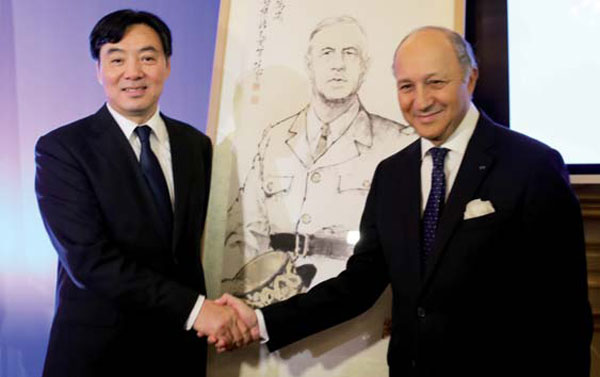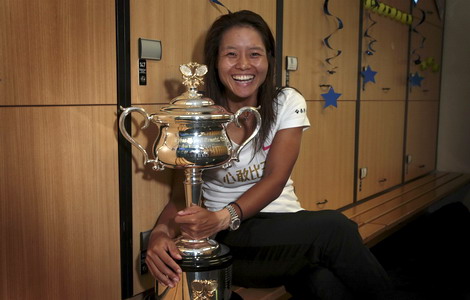Past points to future
Updated: 2014-01-24 08:52
By Li Xiang in Paris (China Daily Europe)
|
|||||||||||
Ekman of the French Institute of International Relations says: "This certainly represents an opportunity for bilateral relations as France has expertise in areas that are key for China's current development in sectors including urbanization, healthcare, energy and others."
But China's fast social and economic transformation will also pose a challenge for relations as the country adjusts. "Understanding the new institutional and policy framework (being established) in China is a difficult task," she says.
|
Chinese ambassador to France Zhai Jun with French Foreign Minister Laurent Fabius in front of a painting of former French president Charles de Gaulle, by Chinese artist Fan Zeng, at a news conference in Paris on Jan 13 to celebrate the 50th anniversary of the establishment of the China-France relationship. Li Xiang / China Daily |
Looking at future business cooperation, some industry experts say China and France need to update their knowledge about each other's economies and markets.
"France is not just a tourist destination and a place for great food," says Daniel Kahn, president of French law firm Kahn & Associes.
France possesses extensive resources of technology in industries including nuclear energy, food-processing and the agricultural sector as well as the treatment of water and air pollution, he says.
"Similarly, China is no longer simply a factory that makes poor-quality goods. The country has been able to build high-speed railways and to send a rocket to the moon."
The relationship will be good for both sides when French companies can benefit from Chinese capital and access to the Chinese market and Chinese companies gain technical know-how from the French, he says.
Another major challenge for Sino-French relations is coordinating bilateral relations with China at a European level, analysts say.
"While the EU-China strategic partnership exists, individual EU member states still have very different approaches and strategies toward China at the moment," Ekman says.
Trade and investment tensions such as the disputes over solar panels and wine exports remain between China and the European Union that may complicate the Sino-French business prospect, she says.
The development of Sino-French relations has not always been smooth over the past 50 years. In 2008 they took a turn for the worse after then French president Nicolas Sarkozy met the Dalai Lama and the Beijing Olympic torch relay was disrupted in Paris.
"Although our bilateral relations have experienced ups and downs, France is still committed to the pursuit of a stronger relationship with China," says Morel, the former French ambassador to China.
Both countries should look to the future and recast the way they look at each other, he says.
But some experts worry that current French politicians' lack of a world vision puts the country at risk of declining international influence.
"Most political leaders now are only interested in their local affairs and elections," says Michel Anfrol, president of Friends of the Foundation of Charles de Gaulle. "The difference is that De Gaulle always had the long-term world vision."
Some argue that France needs to develop a common vision with an emerging power such as China and to reinforce the global partnership on major issues.
"France has the responsibility to make Europe an important pole in the world distribution of power," Raffarin says.
"France and China need to make sure they share the same world vision and are thinking in the same way for the strategy of a multipolar world."
Tran Van Thinh, former ambassador of the European Union to China and chairman of the China-Europa Forum, echoes that opinion, saying France and China should develop a common strategy with priority given to peace and development.
"France has its experience in social and economic aspects that China could follow and share. So we have to cooperate, trust and have confidence in each other."
China and France should also take advantage of the 50th anniversary to encourage greater exchanges between the civil societies, think tanks and the Chinese and French people.
"An increase in the number of bilateral meetings, both formal and informal, is the key to deepening mutual understanding," Ekman says.
The concept of track II diplomacy, informal diplomacy that involves dialogue between academics, retired public servants, public figures and social activists, will be a powerful tool to strengthen mutual trust.
In addition, French Foreign Minister Laurent Fabius announced recently a decision to fast-track visa applications by Chinese tourists, starting on Jan 27, the 50th anniversary of diplomatic ties.
France is one of the most visited countries, and the top European destination for Chinese tourists, a record 1.2 million having visited last year.
"Direct people-to-people exchanges should be encouraged," Morel says.
"For example, the number of people learning Chinese has expanded dramatically in France, and almost all the top schools and universities in France have introduced programs related to China."
The number of Chinese students in France has risen tenfold in the past decade, more than 30,000 students having enrolled in French institutions of high education.
"The future friendship between China and France should not be determined by one man's decision," Raffarin says. "Everyone can contribute to a closer relationship, and people can rely on themselves to listen, to see, and to observe what is happening between China and France."
Li Xiaofei contributed to this story.
lixiang@chinadaily.com.cn
( China Daily European Weekly 01/24/2014 page6)
Today's Top News
More than 300 fall ill on Royal Caribbean ship
8.8% salary hikes expected for 2014
China turns the tables on gamblers
China takes measures against H7N9
Terrorists behind twin explosions in Xinjiang
2014 diplomatic strategy outlined at Davos
China reports another H10N8 case
Big events in the Sino-French relations
Hot Topics
Lunar probe , China growth forecasts, Emission rules get tougher, China seen through 'colored lens', International board,
Editor's Picks

|

|

|

|

|

|






